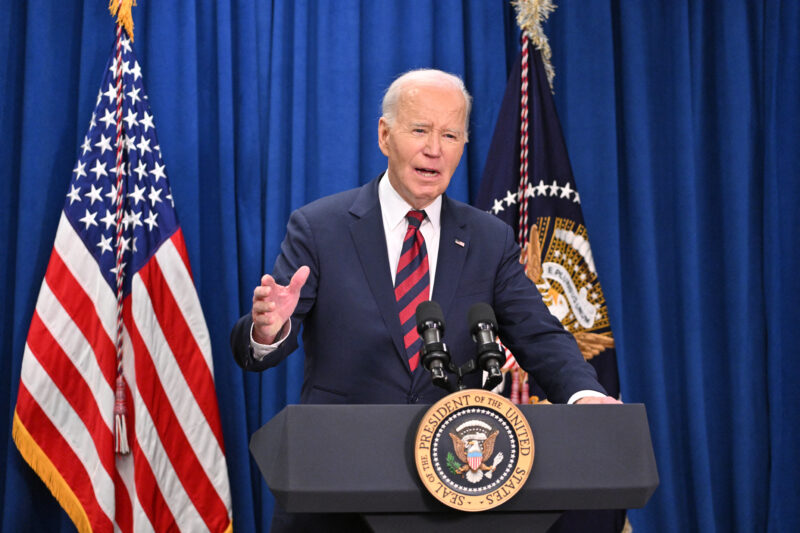New oversight provision passes House alongside $3.3 billion in aid to Israel
The updated language comes amid an ideological battle over U.S. military funding to Israel

Getty Images
In the background the Israeli Iron Dome missile defence system (L) intercepts rockets (R) fired by the Hamas movement towards southern Israel from Beit Lahia in the northern Gaza Strip, and on foreground tens of other intercepts rockets (RR) fired by the Hamas while the Iron Dome is busy with the first rockets, as seen in the sky above the Gaza Strip overnight on May 16, 2021.
The House of Representatives voted last night to approve $3.3 billion in security aid to Israel as part of Congress’s annual appropriations process. Tucked more than 100 pages into the massive Department of State and Foreign Operations spending bill was a new Oversight and Accountability provision governing the way aid is disbursed to American allies.
The goal of the new provision, according to the bill, is to ensure that countries that receive military aid from the U.S. use the money in a way that is consistent with U.S. national security policy. The secretary of state would be required to meet with countries who receive U.S. military aid to ensure that the government complies with U.S. law and in line with U.S. national security policy. If an aid recipient appears to be using the funds in a manner that goes against the agreed upon uses, the secretary of state must inform Congress. Although the language is new, it codifies an already existing policy that has been standard practice between the U.S. and foreign aid recipients for years, according to individuals familiar with the provision.
Although aid to Israel was negotiated in the 2016 Memorandum of Understanding (MOU), which set funding levels for for 10 years, it must be approved annually by Congress.
The provision does not mention any country by name — though Israel receives more foreign military financing from the U.S. than any other country — and will apply to all countries that receive military aid from the U.S.
“When I read this, the first thing that came to mind actually wasn’t Israel,” said Daniel Harsha, who served as a senior staff member on the House Foreign Affairs Committee under former Reps. Howard Berman (D-CA) and Eliot Engel (D-NY). “It was Saudi [Arabia], particularly the use of [foreign military financing] funds for Saudi that were, then, being used to support ongoing operations in Yemen.”
In a statement, J Street praised the proposal. “J Street lobbied both for the full provision of the $3.3 billion in Foreign Military Financing security assistance for Israel pledged in the MOU, and for new measures to help ensure that equipment purchased with such aid is not used to support acts of creeping annexation, violations of Palestinian rights, or in other ways contravene longstanding U.S. interests and values,” Debra Shushan, J Street’s director of government affairs, told Jewish Insider.
In addition to $3.3 billion in military financing for Israel, the bill provides $50 million for the Middle East Partnership for Peace Act; $2 million for U.S.-Israel development cooperation on water, agriculture and energy; and $6 million for collaborative research between Israeli and Arab scientists — a 20% increase. It also requires the State Department to submit a report on the United Nations Relief and Works Agency’s efforts to eliminate antisemitic and violent content in its textbooks.
The spending package, which also provided a massive increase in Palestinian aid and new conditions on U.S. aid to Egypt, passed the House with 217 votes in favor, all of them Democrats. Three Democrats, Reps. Alexandria Ocasio Cortez (D-NY), Rashida Tlaib (D-MI) and Cori Bush (D-MO), who have criticized Israel aid, voted against the bill. Ocaiso-Cortez delivered a speech on the House floor Thursday calling for more congressional oversight over arms sales generally.
The new oversight language comes amid a battle between centrist pro-Israel Democrats who support current aid to Israel and some Democrats who want to restrict or condition that aid. Earlier this year, J Street was among a handful of left-wing Jewish groups to throw its weight behind a bill from Rep. Betty McCollum (D-MN) that would add restrictions to U.S. aid to Israel.
Shushan also expressed support for language in the bill’s accompanying report — a document explaining the legislation and the reasons for it — that urges the secretary of state to discuss with Israel how the country can ensure that its use of American military aid does not make it harder to achieve a two-state solution.
This recommendation, along with the proposed State Department consultations, are “an important first step” in making sure that military equipment Israel purchases with U.S. military aid “may not be used in any way that undermines the prospects of a negotiated two-state solution,” Shushan said. J Street was not involved in drafting the appropriations legislation, a spokesperson told JI.
In a later statement following the House vote, which addressed the new oversight provisions, J Street argued that, “restricting US aid to specific purposes – and enforcing such restrictions – is also responsible, standard practice in the context of US assistance to foreign countries. In the interest of fairness and accountability, it is necessary to avoid a double standard and ensure that Congress and American taxpayers have due visibility into, and control over, how US aid is ultimately used by Israel, as well.”
Critics of conditioning or regulating aid do not view the new provision as particularly worrisome. “There’s no specific conditions here. There’s no restrictions. The committee is solely funding [foreign military financing] for Israel, which is a clear signal of a commitment to provide those funds to Israel,” said Rich Goldberg, a senior advisor at the Foundation for Defense of Democracies and a former staffer on the House Appropriations Subcommittee on State, Foreign Operations and Related Programs (SFOPS) who co-hosts Jewish Insider’s “Limited Liability Podcast.”
“It is by definition in our national security policy to provide the [foreign military financing] to Israel because Congress has appropriated it,” he explained. Goldberg added that Israel has “undoubtedly” already been having such meetings with the State Department for years, and that the new language will do little to alter current practices beyond simply codifying them into law.
The new provision made it into the bill without issue, and no amendments were proposed by members of the House Appropriations Committee to strike or alter it. New proposals frequently spark such amendments from the opposing party.
“We were in close consultation with committee staff and the administration throughout this process. We do not have a concern about this language, which merely codifies the current practice,” AIPAC spokesperson Marshall Wittmann told JI.
“They have the most sophisticated understanding of the legislative process of any of the organizations,” Harsha said of AIPAC. “You would think that if they were concerned about this — and this was the base text of the bill — they could have gotten that out pretty easily.”
The legislation was authored by Rep. Barbara Lee (D-CA), who replaced pro-Israel stalwart Rep. Nita Lowey (D-NY) as chair of SFOPS when the longtime Westchester lawmaker retired at the end of last year. Lee has at times been critical of Israeli policies, and in 2019 she was one of 17 representatives to vote against a measure condemning the Boycott, Divestment and Sanctions movement against Israel. A spokesperson for Lee did not respond to questions from JI regarding the legislation.
“Having worked with her and worked with her staff for many years, she’s very smart. She’s very sophisticated. And I think she understands how to pass legislation, as opposed to a lot of these younger members that are all about the bomb-throwing,” said Harsha. “So maybe she sees this as an important way into, from the left-wing perspective, addressing some of the bigger [foreign military financing] issues.”
Those issues might relate to Israel, or they could have to do with other countries, like Saudi Arabia. “The left has been super outspoken on the Saudi [foreign military financing] issue too,” Harsha noted. “There’s a ton of different ways to read it.”















































